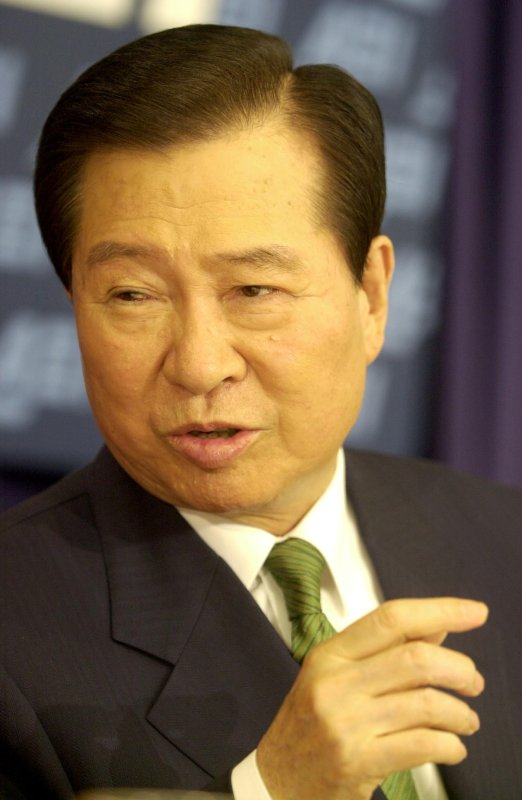1 of 2 | President Kim Dae-jung of the Republic of Korea delivers a major policy address at a luncheon held in his honor at the American Enterprise Institute and the Council of Foreign Relations in Washington, DC, March 8, 2001. President Kim was in Washington D.C. to meet with President George W. Bush. (UPI/Chris Corder) |
License Photo
SEOUL, Aug. 18 (UPI) -- Kim Dae-jung, the former South Korean president who won the 2000 Nobel Peace Prize for seeking rapprochement with North Korea, died on Tuesday at the age of 85.
"Former President Kim had been treated for pneumonia since July 13 but died of heart failure caused by internal organ dysfunctions," a Seoul hospital told a news conference.
The death of Kim, who served as president from 1998-2003, is expected to put pressure on current leader Lee Myung-bak to ease his tough stance toward North Korea.
President Lee expressed deep sorrow over the death of a "great political leader." He added, "The people will long remember his aspirations and accomplishments for democracy and national reconciliation."
Kim has been revered for his life-long campaign for democracy and reconciliation with North Korea. His rapprochement efforts were highlighted by a groundbreaking visit to the North for a historic summit with its leader Kim Jong Il in June 2000. The two leaders agreed to work to end the decades-long hostility between the two halves of the Korean peninsula and achieve unification.
The first-ever summit provided the best chance for peace on the peninsula, the world's last Cold War frontier. Under the June 15 summit agreement, the two Koreas launched a series of reconciliation projects, such as joint industrial and tourism programs, while reconnecting cross-border railways and roads.
The summit helped Kim win the Nobel Peace Prize that year for his tireless efforts to dismantle the Cold War structure on the divided Korean peninsula, a flash point with nearly 2 million troops on both sides. He is South Korea's sole Nobel laureate.
Kim survived assassination attempts, jail and a death sentence on his way to winning the presidency. Since taking office in 1998 at the height of military tensions across the border, he had pushed for reconciliation under a "Sunshine Policy" of aiding and embracing the North as a way to let the isolated nation "take off its Cold War coat."
In his inaugural address, Kim, a reformer with a long history of dissidence, declared that he would abandon the old policy of reunification with the North, taking into account its fear of being absorbed by the affluent capitalist South. Since then, he rarely used the term "unification," stressing instead "peaceful coexistence" with the North.
Kim was also honored for his lifelong struggle for democratization and against military dictatorship. Born to a poor family on a remote island off the southwestern coast, Kim was elected a lawmaker in 1961. But just three days later, his political dream was frustrated because of a military coup led by Gen. Park Chung-hee.
As a candidate in the 1971 presidential election, Kim collected 46 percent of the vote, threatening Park's regime. He limped because of an injury he suffered in a mysterious traffic accident while on the campaign trail at that time.
Two years later, the country's intelligence agency abducted Kim from Tokyo where he was living in exile after Park imposed martial law, and he was about to be dumped him into the Sea of Japan before U.S. agents rescued him.
A military junta led by Gen. Chun Doo-hwan, which succeeded Park, arrested Kim and sentenced him to death on concocted charges of plotting an uprising against the government. He was released after two and a half years and allowed to live in exile in the United States.
Kim returned home in 1985 and led nationwide pro-democracy protests. But he lost again in the 1992 presidential election. After winning the presidency on his fourth attempt in 1997, he said, "I have prepared myself for this job for 40 years."
Kim's liberal successor Roh Moo-hyun inherited the Sunshine Policy of engagement, providing economic aid to North Korea. Roh followed in Kim's footsteps by venturing into Pyongyang for a summit with Kim Jong Il in 2007 and agreed to the "Oct. 4 Declaration" on massive economic aid to help the North rebuild its economy. Roh killed himself last May out of frustration over a corruption investigation.
But Lee Myung-bak, who took office early last year as the country's first conservative leader in a decade, has replaced the "sunshine" initiative with a tough, disarmament-first policy toward the North. Lee has reviewed the two summit agreements and suspended all economic aid to the North because of its nuclear and missile programs.
Lee accused Kim and Roh of pouring aid across the border, saying part of the aid the South gave to the North over the past 10 years is believed to have been diverted to its nuclear and missile development programs.





